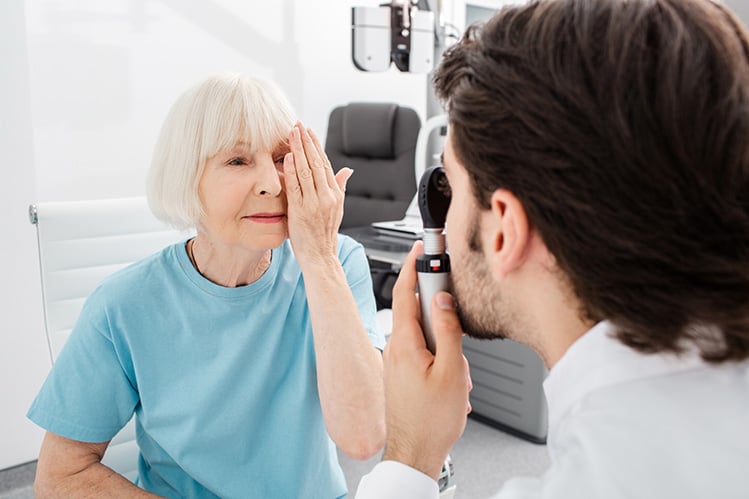Eyes are the windows to the world. They enable us to perceive the beauty around us and to perform daily tasks, from reading to cooking to driving.
As we age, our eyes, like the other parts of our bodies, go through changes. For many seniors, these changes can lead to vision issues and eye health concerns.
According to the scientific journal Gerontology, of the nearly 40 million people who are blind, almost half are age 60 or older. Understanding the most common age-related vision problems not only helps identify potential issues earlier but can safeguard your vision longer.
5 Common Vision Problems in seniors
1. Age-related macular degeneration
Age-related macular degeneration, or AMD, is a common condition and a leading cause of vision loss in people age 50 and older. It causes damage to the macula, a small spot near the center of the retina required for sharp, central vision. Over time, AMD can lead to a loss of central vision, making it difficult to recognize faces, drive, read, and perform other tasks that require straight-ahead vision.
There are two types of AMD—dry and wet—with dry AMD more common. While there's no cure for AMD, certain treatments can slow its progression. The National Eye Institute recommends quitting smoking, getting regular physical activity, maintaining proper cholesterol and blood pressure levels, and eating a healthy diet that includes leafy greens and fish to lower the risk of AMD.
2. Glaucoma
Glaucoma damages the optic nerve, which transmits visual information from the eyes to the brain. If left untreated, it can lead to vision loss or blindness.
This condition, which has various forms, often develops slowly and initially might show no symptoms; hence, it's sometimes called the silent thief of sight. While some risk factors such as age and genetic predisposition can't be altered, early detection and treatment often can protect your eyes against severe vision loss.
3. Cataracts
Cataracts are cloudy areas in the lens of the eye that cause blurry vision. This is the most common cause of vision loss in people over 40 and is the principal cause of blindness worldwide. Symptoms can include cloudy or blurred vision, difficult night vision, and seeing halos around lights.
Fortunately, cataract surgery is generally safe and effective. A doctor replaces the cloudy lens with an artificial one to restore vision.
4. Diabetic retinopathy
For those with diabetes, high blood sugar can lead to diabetic retinopathy. This condition affects blood vessels in the retina, the light-sensitive tissue that lines the back of the eye. It's the most common cause of vision loss among people with diabetes and a leading cause of blindness among working-age adults.
Controlling blood sugar and having regular eye exams are crucial to preventing this condition. In some cases, additional medical treatment might be necessary.
5. Presbyopia
Presbyopia is a natural and common age-related vision change that results in difficulty focusing on close objects. It typically starts in the mid-40s and progresses until the mid-60s. Symptoms can include eye strain, headaches, and problems seeing objects close up.
Eyeglasses, contact lenses, or refractive surgery usually can correct presbyopia. It's important to discuss your options with an eye care professional to determine the best solution for you.

The power of prevention
Although the list of potential vision problems might seem daunting, there's a crucial point to remember: Preventive care makes a difference. Regular eye exams become increasingly important as you age. Early detection and treatment significantly can reduce the risk of permanent vision loss.
Eye doctors can perform several painless tests to assess your risk of developing these conditions or to monitor their progression if they exist. This proactive approach can help ensure that your eyes remain as healthy as possible, giving you the best chance of maintaining your vision and quality of life as you age.
Your golden years are a time for enjoyment and exploration. Don't let preventable vision issues cloud your experiences. Schedule regular eye checkups and stay informed about common vision issues that affect seniors.
